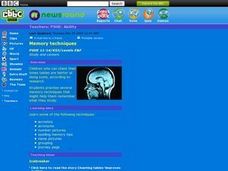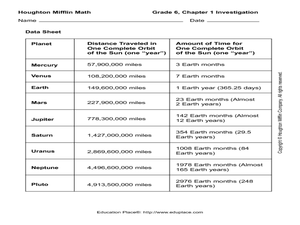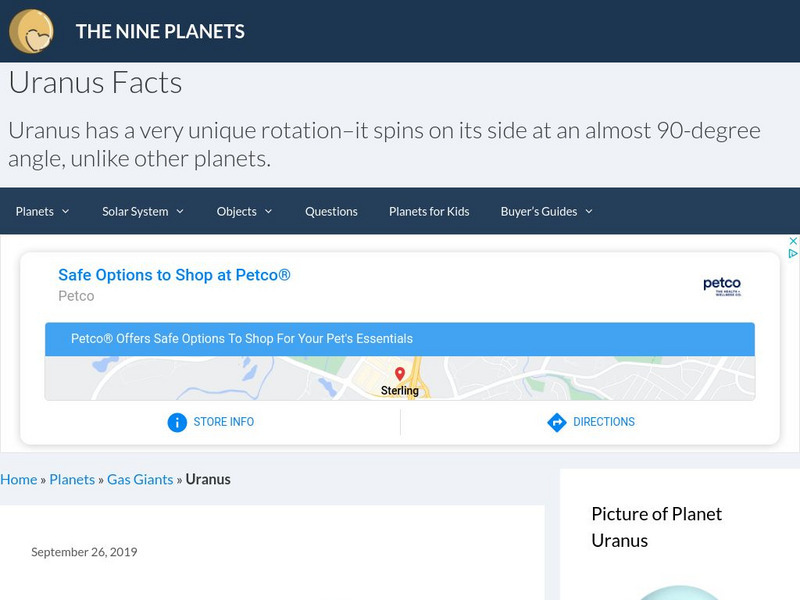Curated OER
Solar System Crossword
In this solar system learning exercise, students fill in a crossword that gives them clues about the solar system. Students solve 31 clues for the crossword.
Curated OER
Memory Techniques
Students enhance memorization skills by using the following techniques: acrostics, acronyms, number pictures, spelling memory tips, name pictures, grouping, and journey pegs.
Curated OER
Central Tendency
Fifth graders compare and contrast different sets of data on the basis of measures of central tendency.
Curated OER
Introduction to Constellations
Students examine constellations. In this astronomy lesson plan, students study various constellations and identify five major constellations. They will construct a model of one of the constellations.
Curated OER
Explorit's Astronomy 2. Quiz
For this astronomy worksheet, students complete a five question multiple choice on-line interactive quiz about astronomy. Prior knowledge is assumed.
Curated OER
Worksheet 28 - Spring 1996
In this math instructional activity, students examine the graph in polar coordinates of r = f(θ). Then they sketch a graph of the modified functions indicated.
Curated OER
The Solar System Word Search 2
In this solar system word puzzle worksheet, students examine the 26 words an names in the word bank and locate them in the word search puzzle.
Curated OER
Grade 6 Math Investigation
In this math investigation worksheet, students find five facts about outer space that contain a number greater then ten million, underlining the digit in the ten millions place. Worksheet has a chart with facts beyond the 10 million place.
Curated OER
Moon, Mars, and Beyond-Mission Briefing
Learners complete this introductory lesson in which they find out about the scenario for a simulated online space mission. They review vocabulary and complete a review sheet to reinforce the details of the mission and its goals.
Curated OER
Astronomical Scales
Students describe the different units of measurement. In this space science lesson, students calculate astronomical distances using a scale. They explain the significance of using scientific notation in expressing very small or very...
Smithsonian Institution
National Air and Space Museum: Exploring the Planets: Our Solar System
Take a tour of our solar system and learn fascinating details and observations about the planets.
NASA
Nasa: Neptune: Overview: The Windiest Planet
Prepared by NASA, this site provides a detailed look at the planet Neptune. The menu tabs are divided into overview, moons, rings, photo gallery, and facts and figures. Just click to access specific information on any of these topics.
Story Behind the Science
Story Behind the Science: The Discovery of Neptune [Pdf]
The scientific history behind the discovery of the planet Neptune.
Enchanted Learning
Enchanted Learning: The Planets
This survey of the planets includes all the basics, size, mass, atmosphere, length of day, and the like. It features interactive activities and learning exercises and compares all of the planets in colorful tables.
Views of the Solar System
Views of the Solar System: Neptune
Explore the planet Neptune through this site that includes vivid multimedia resources. Learn Neptune statistics and view numerous images.
University of Texas at Austin
The University of Texas Mc Donald Observatory: Neptune
Discover interesting facts about Neptune, the fourth-largest planet.
NASA
Nasa Space Place: All About Neptune
Learn fascinating facts about Neptune, the last of the planets in our solar system.
PBS
Pbs Learning Media: The Planets of the Solar System
As technology has advanced, so do our views and understanding of the solar system. No longer do we have to rely on our unaided eyes to observe planets. View these high-quality images of planets provided by NASA spacecraft.
NASA
Nasa: Planetary Data Sytem: Welcome to the Planets
Collection of images, with vocalized explanatory captions, of the planets acquired by NASA as part of its exploratory space programs.
CK-12 Foundation
Ck 12: Earth Science: Planets in Our Solar System Study Guide
A quick overview of the eight planets in our solar system.
Science Buddies
Science Buddies: How Big Are the Planets in Our Solar System?
This activity explores the relative size of the eight planets that circle around the Sun.
California Institute of Technology
Cool Cosmos: Ask an Astronomer: Neptune
Resource provides a deeper look at the planet Neptune. Just click on the frequently asked question link and dive into knowledge.
NASA
Nasa Space Science Data Archive: Neptune Fact Sheet
Resource has text information to compare Neptune with Earth. Includes Neptune observational data, orbital data, magnetosphere, and atmosphere. Also contains an image of Neptune that can be enlarged.
Nine Planets
The Nine Planets: Uranus
An excellent report on the planet Uranus. The site includes detailed information about the planet as well as links to information about Uranus moons, unmanned probes sent to explore Uranus, and an extensive set of images of the planet.



















